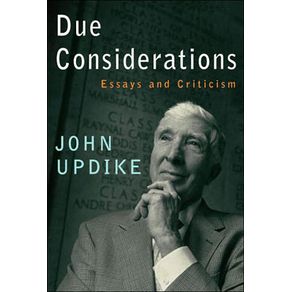John Updike’s sixth collection of essays and literary criticism opens with a skeptical overview of literary biographies, proceeds to five essays on topics ranging from China and small change to faith and late works, and takes up, under the heading “General Considerations,” books, poker, cars, and the American libido. The last, informal section of Due Considerations assembles more or less autobiographical pieces—reminiscences, friendly forewords, comments on the author’s own recent works, responses to probing questions. In between, many books are considered, some in introductions—to such classics as Walden, The Portrait of a Lady, and The Mabinogion—and many more in reviews, usually for The New Yorker. Ralph Waldo Emerson and the five Biblical books of Moses come in for appraisal, along with Uncle Tom’s Cabin and The Wizard of Oz. Contemporary American and English writers—Colson Whitehead, E. L. Doctorow, Don DeLillo, Norman Rush, William Trevor, A. S. Byatt, Muriel Spark, Ian McEwan—receive attentive and appreciative reviews, as do Rohinton Mistry, Salman Rushdie, Peter Carey, Margaret Atwood, Gabriel García Márquez, Haruki Murakami, Günter Grass, and Orhan Pamuk. In factual waters, Mr. Updike ponders the sinking of the Lusitania and the “unsinkable career” of Coco Chanel, the adventures of Lord Byron and Iris Murdoch, the sexual revolution and the advent of female Biblical scholars, and biographies of Robert Frost, Sinclair Lewis, Marcel Proust, and Søren Kierkegaard.
Reading Due Considerations is like taking a cruisethat calls at many ports with a witty, sensitive, and articulate guide aboard—a voyage not to be missed.



